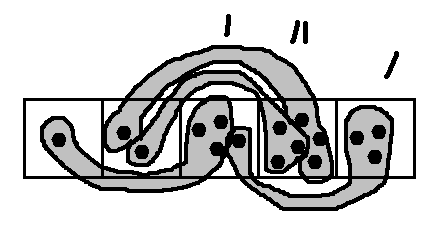Exploding Dots
6.9 Solutions
As promised, here are my solutions to the question posed.
1.
a) \(\left(2x^4+3x^3+5x^2+4x+1\right)\div \left(2x+1\right)=x^3+x^2+2x+1\)
b) \(\left(x^4+3x^3+6x^2+5x+3\right)\div \left(x^2+x+1\right)=x^2+2x+3\)
And if \(x\) happens to be 10, we’ve just computed \(23541\div 21 =1121\) and \(13653 \div 111 = 123\).
2. We can do it. The answer is \(x^2+2x+1\).

3.
a) For \(x=10\) it says \(14641 \div 11 = 1331\).
b) For \(x=2\) it says \(81 \div 3 = 27\).
c) For \(x=3\) it says \(256 \div 4 = 64\).
For \(x=4\) it says \(625 \div 5 = 125\).
For \(x=5\) it says \(1296 \div 6 = 216\).
For \(x=6\) it says \(2401 \div 7 = 343\).
For \(x=7\) it says \(4096 \div 8 = 512\).
For \(x=8\) it says \(6561 \div 9 = 729\).
For \(x=9\) it says \(10000 \div 10 = 1000\).
For \(x=11\) it says \(20736 \div 12 = 1728\).
d) For \(x=0\) it says \(1 \div 1 = 1\).
e) For \(x=-1\) it says \(0 \div 0 = 0\). Hmm! That’s fishy! (Can you have a \(1 \leftarrow 0\) machine?)
4. \(\dfrac{x^3-3x^2+3x-1}{x-1}=x^2-x+1\)
5. \(\dfrac{4x^3-14x^2+14x-3}{2x-3}=2x^2-4x+1\)
6. \(\dfrac{4x^5-2x^4+7x^3-4x^2+6x-1}{x^2-x+1}=4x^3+2x^2+5x-1\)
7. \(\dfrac{x^{10}-1}{x^2-1}=x^8+x^6+x^4+x^2+1\)
8. We know that \(\left(2x^2+7x+6\right) \div \left(x+2\right) = 2x+3\) so I bet \(\left(2x^2+7x+7\right) \div \left(x+2\right)\) turns out to be \(2x+3+\dfrac{1}{x+2}\). Does it?
9. \(\dfrac{x^4}{x^2-3}=x^2+3+\dfrac{9}{x^2-3}\)
10. \(5x^2-2x+21+\dfrac{-14x^2+82x-14}{x^3-4x+1}\)
Resources
Books
Take your understanding to the next level with easy to understand books by James Tanton.
BROWSE BOOKS![]()
Guides & Solutions
Dive deeper into key topics through detailed, easy to follow guides and solution sets.
BROWSE GUIDES![]()
Donations
Consider supporting G'Day Math! with a donation, of any amount.
Your support is so much appreciated and enables the continued creation of great course content. Thanks!
Ready to Help?
Donations can be made via PayPal and major credit cards. A PayPal account is not required. Many thanks!
DONATE![]()


